Category: "Broadway"
Review: The Other Place
Jan 11th
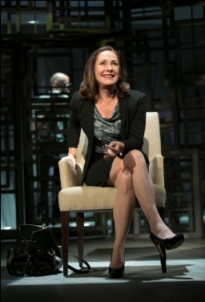
The central character in Sharr White’s drama The Other Place is suffering the disorientating effects of a condition she’s self-diagnosed as brain cancer. Her helpless confusion is likely to be shared by the audience, as the play seems intent on providing shifting perspectives that keep us constantly guessing as to what’s actually going on. The results are undeniably compelling but also frustratingly gimmicky, as if the playwright was more interested in pulling the rug out from under us than fully involving us in her character’s plight.
Laurie Metcalf, repeating her role from last year’s well-received off-Broadway production, delivers a galvanizing performance as Juliana, a former scientist who now makes her living as a pitchperson for a pharmaceutical company. Delivering a lecture at a conference in the Virgin Islands, she finds herself suddenly unable to form coherent thoughts, endlessly distracted by a young attendee clad only in a yellow bikini who she repeatedly harangues.
In subsequent confrontations with her oncologist husband (a sympathetic Daniel Stern) who she’s in the process of divorcing and a female doctor (Zoe Perry) who he’s enlisted to examine her, Juliana proves alternately vulnerable and abrasive. The former quality is markedly evident in her poignant attempt to reconcile with her estranged daughter (Perry, again) who left home years earlier to run off with an older man (John Schiappa).
Or did she? That’s one of the many tantalizing questions presented by the fractured narrative that correlates with Juliana’s confused mental state. To reveal more of the play’s secrets would be unfair, but it should be pointed out that it’s at its most effective in the climactic scene in which Juliana fully comes to grips with her circumstances via an encounter with a young woman (Perry, in her third role) who she takes to be her daughter. Devoid of narrative machination, it packs an emotional punch that much of the coldly clinical play otherwise lacks.
Still, the play is well worth seeing, thanks to both to Metcalfe’s ferociously funny, intense performance—sure to be remembered at Tony Award time--and the effectively visceral staging by director Joe Mantello. The production elements convey the main character’s mental confusion in vivid fashion, from Eugene Lee and Edward Pierce’s set composed of hundreds of empty frames to Fitz Patton’s hallucinatory sound design to William Cusick’s haunting projections.
Samuel J. Friedman Theatre, 261 W. 47th St. 212-239-6200. www.Telecharge.com. Through Feb. 24.
Review: Glengarry Glen Ross
Dec 9th
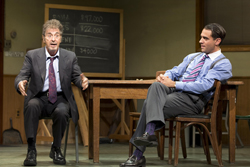
Ah, the benefits of diminished expectations. Since it began previews in October, the Broadway revival of David Mamet’s Pulitzer Prize-winning Glengarry Glen Ross has been the target of negative buzz--primarily over Al Pacino’s unfocused performance--which only got louder when the production delayed its opening for a month, supposedly because of Hurricane Sandy. Well, the show has finally been deemed ready to be seen by critics, and it’s a pleasure to report that it’s fully up to snuff.
That the production is housed in a theater just a few yards away from the soon-to-be shuttered The Anarchist, Mamet’s most recent, critically reviled effort, ironically serves as a reminder that this superb dramatist seems to have lost his way in recent years.
The 1983 play, last seen on Broadway as recently as seven years ago, holds up marvelously well in its depiction of American capitalism as its most cutthroat. Set in a sleazy Chicago real estate office, it depicts the savage machinations among a motley group of rapacious salesman desperately competing with each other to get to the top of the sales tote board and receive the Cadillac that goes with it. Or at least, not lose their jobs.
Chief among them is the fast-talking Ricky Roma (a superb, perfectly cast Bobby Cannavale), who in an early scene is seen delivering a slick sales pitch in a Chinese restaurant to a hapless potential customer (Jeremy Shamos), like a jungle predator circling its prey.
The veteran member of the tribe is the aging Shelly “The Machine” Levine (Pacino), who desperately tries to procure invaluable leads from the stand-offish office manager (David Harbour) by blatantly offering him kickbacks.
The plot is set in motion when salesman Dave Moss (John C. McGinley) attempts to persuade his whiny colleague George (Richard Schiff) to break into the office and steal the all-important leads, which they will then sell to the competition. Act Two concerns the aftermath of the robbery, with an officious detective (Murphy Guyer) hauling them into an office one-by-one for interrogation.
Filled with Mamet’s trademark hilariously pungent and profane dialogue, the play is a marvel of concision and character illumination, especially in its handling of the alternately pathetic and boasting Levine. As played with hangdog pathos and expert comic timing by Pacino, the character is a haunting reminder of the fragility of success.
Director Daniel Sullivan has assembled an expert ensemble for his crackling production, with every actor embodying his role with a fully lived-in authenticity. Eugene Lee’s sets and Jess Goldstein’s costumes are equally spot-on for this revival which has been unfairly maligned as a mere star vehicle for Pacino. Not that there’s anything wrong with that, either.
Gerald Schoenfeld Theatre, 236 W. 45th St. 212-239-6200. www.Telecharge.com. Through Jan. 20.
Review: Golden Boy
Dec 7th
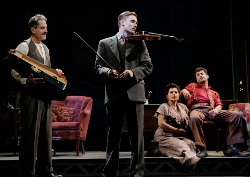
Clifford Odets’ rarely seen 1937 drama Golden Boy is receiving a loving revival courtesy of the Lincoln Center Theater, which previously mounted his classic Awake and Sing! to great acclaim. Given historical resonance by its being performed at the Belasco, the very theater in which it was presented by the legendary Group Theatre 75 years ago, this stirringly staged and beautifully acted production succeeds in bringing this melodramatic but still powerful work to dramatic life.
Director Bartlett Sher has assembled a superb nineteen-member ensemble for the show, which tells the story of Joe Bonaparte (Seth Numrich), the son of a widowed Italian immigrant (Tony Shalhoub) who dreams of his son fulfilling his talents as a violinist. Instead, Joe decides to go for the easy money as a prize fighter, despite the risks it poses to his hands. After brashly barging into the office of low-level boxing promoter Tom Moody (Danny Mastrogiorgio), Joe begins his ascent to the top while falling in love with Moody’s beautiful young mistress Lorna (Yvonne Strahovski, of TV’s Dexter), who soon returns his affections.
As his father helplessly watches in dismay from the sidelines, Joe quickly succumbs to his vision of the American dream, which in this case includes the complicity of a vicious, dandyish gangster (the compelling Anthony Crivello) who takes an unhealthy interest in his latest acquisition. He eventually indeed rises to the top, but at a tragic personal cost.
Odets’ drama, inspired by his own self-disgust at selling out to Hollywood, has no shortage of hoary elements. The characters are often stereotypical—the father’s Jewish best friend, the philosophy spouting Mr. Carp (Jonathan Hadary), being a prime example—and the play is not exactly subtle in its hammering home of its themes and allegories. But it remains compelling nonetheless, thanks to its frequently funny, pungent dialogue and its sheer conviction.
Director Sher displays a great affinity for the dated material, giving the production a vintage feel in its performances and design that honors the past while not devolving into a museum piece. The look of the show is gorgeous, from Michael Yeargan’s striking sets seemingly inspired by Edward Hopper’s paintings to Donald Holder’s expressionistic lighting to Catherine Zuber’s period-perfect, character revealing costumes.
The large cast composed of many theater veterans strikes all the right notes. Although Numrich is never fully convincing as a literally killer fighter, he delivers a sensitive, anguished portrayal that is always riveting. The gorgeous Strahovski, in the role originally played by Frances Farmer, perfectly conveys Lorna’s complex mixture of toughness and vulnerability; Shalhoub is deeply moving as the father who loves his son no matter what; and Danny Burstein beautifully underplays as Joe’s caring trainer. But there isn’t a weak link the cast, which also includes such reliable pros as Ned Eisenberg, Daniel Jenkins and Dagmara Domincyzyk.
Belasco Theatre, 111 W. 44th St. 212-239-6200. www.telecharge.com. Through Jan. 20.
Review: The Anarchist
Dec 3rd
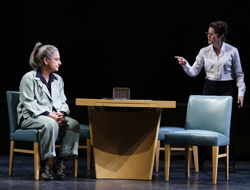
A situation rife with dramatic possibilities is given a frustratingly airless treatment in David Mamet’s new drama about a prisoner arguing for her parole before an impassive prison official. Wasting the talents of Patti LuPone and Debra Winger, the latter marking her Broadway debut, The Anarchist is a self-indulgent exercise that, with its barely 70-minute running time and severely limited emotional palette, hardly belongs in a Broadway house (not to mention charging astronomical Main Stem prices).
Set in the dingy confines of the unspecified official’s office—she may or may not be the warden—the play depicts the encounter between Cathy (LuPone), a former violent radical (think the Weather Underground) who was imprisoned decades earlier for the murder of a police officer. Now having an undergone a religious conversion from Judaism to Catholicism, the contrite prisoner proclaims both her innocence and her supposed rehabilitation.
Responding to her pleas in argumentative rhetorical fashion is Ann, whose primary response is to repeatedly offer the possibility of Cathy’s release if she would only give up the whereabouts of her former lover and partner-in-crime.
The give-and-take seems to go endlessly, thanks to the playwright’s stultifying dialogue that displays little of the fiery spark for which he’s renowned. This is Mamet in minimalist mode, more reminiscent of such similarly stifling efforts as The Cryptogram than such early classics as American Buffalo and Glengarry Glen Ross. By the time the brief evening reaches its supposedly shocking conclusion, playgoers will be left scratching their heads.
Mamet, as he’s demonstrated many times in the past, does himself no favors by also directing the piece. There’s no dramatic momentum to the proceedings, and even these normally reliable actresses seem mainly adrift. Both deliver competent, at times even forceful performances, but they have so little to work with that they barely make an impact. Surprisingly, the veteran LuPone is hard to understand at times, often swallowing her lines, while relative theater novice Winger projects with authority.
While it would be silly to look for lavishness in a prison office, Patrizia Von Brandenstein’s set design seems even more wanly drab than it needs to be, and her unflattering costumes—LuPone in a bulky prison uniform, Winger in a mannish pantsuit—make the performers seem heavier than they actually are.
The frequently repetitive dialogue is peppered with philosophical ruminations about politics, religion, crime and punishment, but here they seem more redolent of the playwright’s soapbox than they are organic to the characters and situation. The Anarchist is represents Mamet at his most mannered and inaccessible, and that’s saying something.
Golden Theatre, 252 W. 54th St. 212-239-6200. www.Telecharge.com. Through Feb. 17.
Review: Dead Accounts
Nov 30th
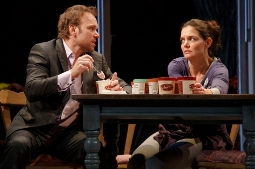
The ever-reliable Norbert Leo Butz should earn a Broadway MVP award for his dynamic comic turn in Dead Accounts, the latest effort by the prolific scribe Theresa Rebeck (Seminar, The Understudy, Mauritius). This comedy set in America’s heartland—specifically, Cincinnati—wastes a sterling cast, including tabloid media darling Katie Holmes, in a half-baked tale that doesn’t even manage to follow through on its thin premise.
Butz plays Jack, who in the play’s beginning is seen making an unannounced visit to his family home inhabited by unmarried sister Lorna (Holmes), mother Barbara (Jayne Houdyshell) and seriously ill, unseen father. Since he’s throwing money around with careless abandon, it soon becomes apparent that his homecoming has been prompted by more than nostalgic reasons, with the reason made clear shortly before the first act curtain. Complicating things even further is the arrival of his soon to be ex-wife Jenny (Judy Greer), whose dislike for his family is reciprocal.
To reveal the secret behind Jack’s return, hinted at in the play’s title, would be to spoil one of its few comic surprises. Suffice it to say that he’s on the lam and that Jenny is less interested in reuniting than in persuading him to share his ill-gotten spoils.
Subplots involving the father’s worsening condition and the reciprocal attraction between Lorna and Jack’s sad sack best friend Phil (Josh Hamilton) go nowhere, with the play’s chief comic mileage derived from Jack’s ebullient personality and penchant for toting home copious amounts of food. But when the play’s biggest laugh stems not from not from a situation or line of dialogue but rather the appearance of a box of wine, you know that something is awry.
Although some may find him over-the-top, Butz brings so much comic energy to his portrayal of the ice-cream obsessed Jack that he single-handedly ratchets up the proceedings. But while Houdyshell brings nice grace notes to her sensitive turn as the worried mom, the rest of the performers don’t fare as well. Holmes, although admirably willing to be de-glamorized as the improbably still single sister, doesn’t possess the stage chops to come across here as much more than bland. Hamilton is underused as the nebbishy friend, and Greer, so effective in her film and television work, mainly seems wan and uncomfortable onstage.
Director Jack O’Brien has staged the proceedings with his usual efficiency although without a shred of inspiration, and a climactic scenery transformation, meant to convey one character’s spiritual epiphany, merely seems extraneous. It’s indicative of all the effort that’s been invested in this show with very little pay-off.
The Music Box, 239 W. 45th St. 212-239-6200. www.Telecharge.com.